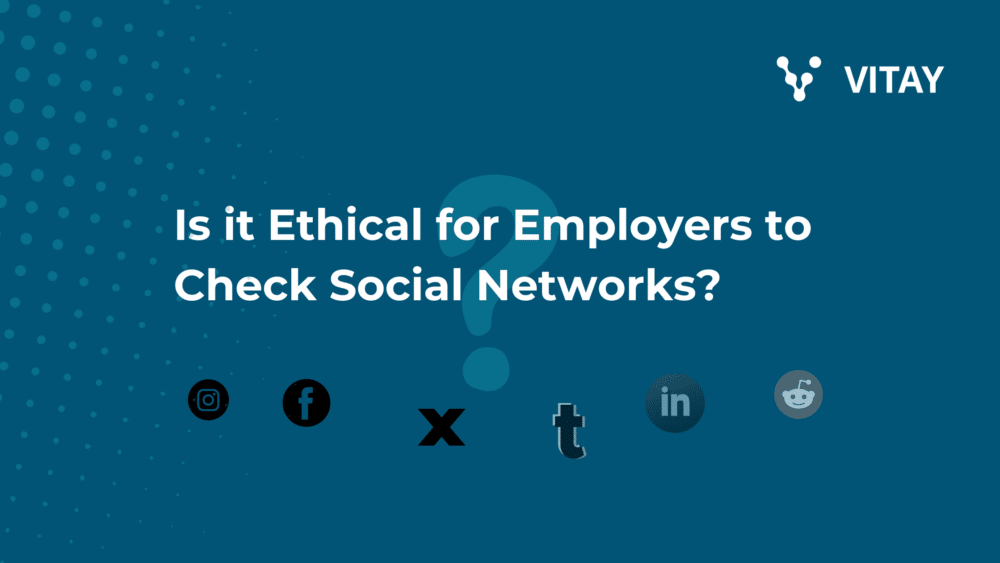The majority of people spend a lot of time online, including on social media. Research shows that the average person spends more than 2 hours daily—one-third of their online time—on social networks. In such a world, the question arises: “Is it ethical for employers to check social networks?”
This article will explore the ethical considerations, legal implications, necessity, and best practices surrounding the practice of social media screening in the hiring process. As employers seek to find the best candidates, the intersection of privacy, professionalism, and ethical hiring practices becomes crucial.
So, Is It Ethical for Employers to Check Social Networks?
Many employers are intrigued by checking social networks for staff or candidates, but they aren’t sure about their ethics. Simply put, it is generally considered ethical for employers to check social media networks, with some caveats. Employers are entitled to use a breadth of information in making hiring decisions. Still, there are privacy, discrimination, and transparency considerations each company must consider when checking social media networks.
Privacy Concerns
One of the primary ethical considerations in social media screening is respecting candidates’ privacy. While it is common for employers to look at publicly accessible information, the focus should remain on job-relevant content. Candidates often share personal information on social networks that may not pertain to their professional abilities. Employers must tread carefully, ensuring that their screening processes do not unnecessarily invade candidates’ personal lives.
Discrimination Risks
Screening candidates through social media can inadvertently introduce bias into the hiring process. Employers may encounter information that reveals a candidate’s race, gender, religion, or sexual orientation, which can lead to discriminatory practices. When possible, employers should take steps such as redacting protected class data from profiles before reviewing. Training and implementing blind recruitment practices can also help minimize these biases by focusing on qualifications rather than personal characteristics.
Transparency
Transparency is essential in the screening process. To comply with business ethics, employers should inform candidates about their social media screening process. They should detail what information will be reviewed and how it will be utilized. This openness aligns with ethical hiring practices and will build trust with potential employees. Candidates should feel empowered to know how their online presence may influence their job prospects.
Legal Implications vs. Ethical Considerations
While it is crucial for employers to adhere to legal requirements regarding social media screening, practicing ethical hiring goes beyond mere compliance. Legal considerations include obtaining candidate consent for screening and avoiding discriminatory practices based on information gleaned from social media.
When unsure of what may fall into a gray area, rely on professional advice. Employers should consult legal experts to navigate jurisdiction-specific regulations effectively. For example, the area you’re hiring for may have standards different from those of other locations. In this way, hiring managers can feel secure that screening processes are both legally compliant and ethically sound.
The Necessity of Social Media Screening
“Is it ethical for employers to check social networks?” isn’t the only relevant question. Is it necessary? Is it something hiring managers should even spend time on? Consider the following when deciding what to do in your own organization.
Why Do Employers Use Social Media Screening?
Employers often turn to social media screening as a tool to glean insights into a candidate’s character, professionalism, and cultural fit within the organization. Social media can provide a glimpse into a candidate’s values and behavior outside of formal job interviews. Additionally, screening can help to mitigate overall risk by identifying potential red flags associated with a candidate’s online presence.
Red Flags to Consider
If you decide to check social networks, what exactly should you look for? When conducting social media screenings, employers should keep an eye out for specific red flags, including:
- Inappropriate Behavior – Offensive language, discriminatory remarks, or explicit content can signal potential issues with a candidate’s judgment or show a lack of cultural fit.
- Poor Judgment – Posts that involve illegal activities or inflammatory comments may indicate future challenges based on poor decision-making.
- Lack of Professionalism – You may notice a general carelessness, or even negative remarks about previous employers or workplace cultures, which can raise concerns about attitude or behavior.
- False Information – Social media can be a good place to look for discrepancies between online profiles and resumes or interview responses, indicating a lack of integrity.
Employers must focus on job-relevant information while avoiding discriminatory practices during their evaluations. This requires a careful balance, but it’s essential not to let non-relevant activity impact how you feel about a candidate.
Best Practices for Ethical Social Media Screening
In order to be sure that social media screenings remain ethical, business leadership should follow these best practices:
- Use Third-Party Screening Providers – Engaging third-party providers can ensure compliance with legal standards and help minimize bias in the screening process.
- Develop Clear Policies – Establish policies that outline acceptable and unacceptable findings during screening. This creates a standardized approach to evaluating candidates.
- Train Hiring Managers – Providing training for hiring managers ensures that they interpret findings responsibly and avoid making judgements that are too subjective.
- Regularly Update Policies – As legal and ethical standards evolve, it is essential for employers to regularly review and update social media screening policies to remain compliant and ethically sound.
The question of whether it is ethical for employers to check social networks is not an easy one; in fact, the issue is complex and multifaceted. By considering the ethical implications, legal requirements, and best practices surrounding social media screening, employers can navigate this landscape responsibly and do what is in their best interest (as well as the candidate’s).
Ultimately, the goal should be to balance the need for information with respect for candidates’ privacy and to foster a fair, equitable hiring process. Best of all, maintaining fairness and transparency in the process will build trust and create a strong culture based on top talent.




Comments are closed.